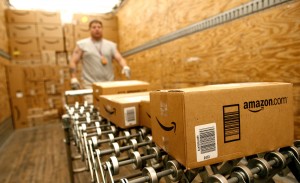
One of Amazon’s more hotly contested and expensive legal battles has been what some states so blatantly dubbed “The Amazon Tax.” According to a decades-old Supreme Court decision, catalog retailers and online retailers do not have to charge sales tax in states where they have no physical presence, but state governments realized that Amazon’s distribution centers amounted to a physical presence. In a firestorm of legislation across the country, states began to draft legislation and file lawsuits against the retailer for sales tax.
In some cases, Amazon worked out deals with those states, promising new construction and new jobs in exchange for a delay in the new legislation or a pass on the back taxes; in other states, Amazon simply closed the centers and laid off its employees, thereby erasing its “presence” in the state. A handful of states where Amazon essentially needed to keep the centers open worked out their legislation and concerns with the retailer, and many of them agreed to a delay in Amazon’s collection of the tax.
But now that most of the states are now requiring full compliance with their own tax laws, a recent report has shown a drop in sales in states where the tax was enacted. As much as a ten percent drop in consumer spending to the site has been reported, leading some to question whether there is any truth to the long held criticism that physical retailers, especially independent bookstores, really are losing business to the big-box shopping mentality.
While Amazon maintains that it will continue to thrive for its superior prices, convenient shipping, and above standard customer service, there’s another factor that supports Amazon’s position as it pertains to sales tax. With so many county and city governments within each state charging their own sales taxes on purchases, consumers will still be better off making online purchases, regardless of whether the state collects sales tax. The dubious honor of highest combined sales tax in the country currently goes to the town of Arab, Alabama, where its citizens pay 13.5% sales tax; the state sales tax is only 4%, so online purchases make sense in that area. While some states do not charge a state sales tax on certain items, like Kentucky’s decision not to collect on books, only two states in the country charge sales tax on groceries, Mississippi and Alabama. Consumers in those states are still going to come out far ahead by buying grocery items from Amazon as the retailer is not required to collect sales tax in either of those states yet.
Amazon currently collects sales tax in twenty states, with new states still waiting to enact their taxes. The online retailer has rightfully stated that it supports and will comply with a federal sales tax decision that allows one streamlined system for online retailers, but that the need to establish fifty different modes of taxation on web-based purchases simply wasn’t feasible.
Mercy Pilkington is a Senior Editor for Good e-Reader. She is also the CEO and founder of a hybrid publishing and consulting company.
